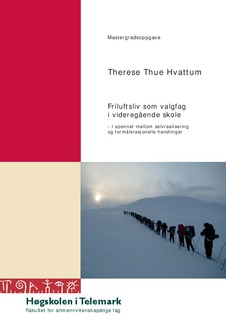Friluftsliv som valgfag i videregående skole - I spennet mellom selvrealisering og formålsrasjonelle handlinger
Master thesis
Published version
Permanent lenke
http://hdl.handle.net/11250/2438770Utgivelsesdato
2012Metadata
Vis full innførselSamlinger
Originalversjon
Hvattum, T.T. Friluftsliv som valgfag i videregående skole - I spennet mellom selvrealiseringog formålsrasjonelle handlinger. Master thesis, Telemark University College, 2012Sammendrag
NORSK SAMMENDRAG: Målet med denne oppgaven har vært å få en bedre forståelse for hvorfor elever velger friluftsfag som valgfag i den videregående skolen. Min hovedproblemstilling har således vært: Hvilke motiver har elever for valg av friluftsfag i den videregående skolen? I tillegg har jeg noen underproblemstillinger som ser på elevenes friluftsbakgrunn, kulturelle bakgrunn og hva de ønsker videre med friluftsfaget. Metoden som anvendes består av 10 kvalitative intervjuer av elever som har valgt friluftsfaget ved en videregående skole i Nordland, samtidig som de følger studiespesialisering. Innenfor de teoretiske rammeverk har jeg anvendt sosiologisk teori fra Pierre Bourdieu, Anthony Giddens, samt Max Weber. Et utdrag av deres teori er presentert og diskutert i forhold til min innsamlede data. Begreper som habitus, kulturell kapital, tid – rom distansering, individualisering, verdi og formålsrettede handlinger har stått sentralt i oppgaven. Motivene informantene oppga til å velge faget, kan oppsummeres i fem kategorier: Samhold, kontemplasjon, identitetsutvikling, læring og studiepoeng. Informantene veier motivene noe ulikt og således har det vært en utfordring å analysere hva hver enkelt informant mener er det viktigste motivet til å velge faget. På bakgrunn av det, har det også vært vanskelig å foreta et entydig skille mellom informanter som mener friluftsfaget er et selvrealiseringsfag og informanter som i hovedsak mener de har valgt faget på bakgrunn av en formålsrettet handling. Det kan likevel ses en sammenheng med informanter som har vært aktive i friluftslivet i barndommen, også i større grad støtter seg til valget av friluftsfaget som en selvrealiserende handling mer enn en formålsbasert handling. ENGLISH ABSTRACT: The main purpose of this research paper is to gain better knowledge of why students choose outdoor activities as an optional subject at high school. My main research question has thus been: What motives have students had for choosing outdoor courses in high school? I have developed several relevant underlying questions, in addition to the main research question, that revolve around the students cultural and outdoor background and what they want for the future with the outdoor course. The method in this paper consists of ten qualitative interviews of students that have chosen outdoor course at a high school in Nordland County in Norway while pursuing academic specialization. Within the theoretical framework, I have applied the sociological theory of Pierre Bourdieu, Anthony Giddens and Max Weber. An excerpt of their theory is presented and discussed in relation to my collected data. Terms such as habitus, cultural capital, time - space separation, individualization, value and purpose - oriented actions have been central in this paper. The reasons students gave for choosing the subject can be summarized in five categories: Unity, contemplation, identity development, learning and credits. Informants weigh their motives in different ways and thus there has been a challenge to analyze what informant believes is the most important for choosing the subject. In light of that it has also been difficult to make a clear distinction between informants who think the subject is an outdoor self- realizing course and informants that essentially mean they have chosen the subject on the basis of a purposeful action. It may still be a connection with participants who have been active in outdoor activities in childhood, also increasingly relies on the choice of outdoor field as a self-realization to action more than an objective-based action. ENGLISH ABSTRACT: The main purpose of this research paper is to gain better knowledge of why students choose outdoor activities as an optional subject at high school. My main research question has thus been: What motives have students had for choosing outdoor courses in high school? I have developed several relevant underlying questions, in addition to the main research question, that revolve around the students cultural and outdoor background and what they want for the future with the outdoor course. The method in this paper consists of ten qualitative interviews of students that have chosen outdoor course at a high school in Nordland County in Norway while pursuing academic specialization. Within the theoretical framework, I have applied the sociological theory of Pierre Bourdieu, Anthony Giddens and Max Weber. An excerpt of their theory is presented and discussed in relation to my collected data. Terms such as habitus, cultural capital, time - space separation, individualization, value and purpose - oriented actions have been central in this paper. The reasons students gave for choosing the subject can be summarized in five categories: Unity, contemplation, identity development, learning and credits. Informants weigh their motives in different ways and thus there has been a challenge to analyze what informant believes is the most important for choosing the subject. In light of that it has also been difficult to make a clear distinction between informants who think the subject is an outdoor self- realizing course and informants that essentially mean they have chosen the subject on the basis of a purposeful action. It may still be a connection with participants who have been active in outdoor activities in childhood, also increasingly relies on the choice of outdoor field as a self-realization to action more than an objective-based action.
